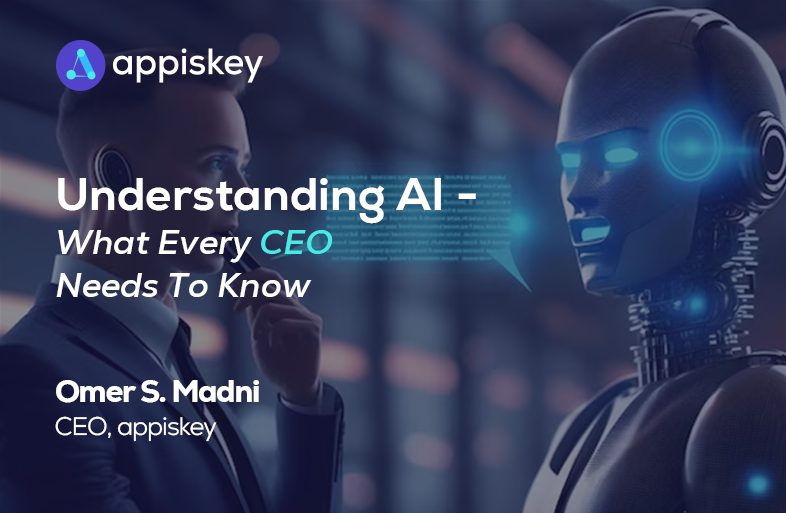Understanding AI – What Every CEO Needs To Know

Understanding AI makes a sizable impact on companies. In fact, it is essential for organizations to effectively scale the technology across all departments. This entails integrating AI into core business processes, workflows, and customer journeys, thereby optimizing decision-making and daily operations. Long story short, AI can enable companies to unlock their full potential to significantly enhance performance and profitability.
Understanding AI and Its Transformative Impact On Businesses
A Brief Intro
In today’s rapidly evolving business landscape, AI has emerged as a transformative force, packed with immense potential to revolutionize industries and drive unprecedented growth. As CEOs steer their organizations through digital disruption, it has only become more imperative for them to gain a further grasp on AI, and all the complexities & benefits it entails.
AI is no longer confined to the realm of data scientists and tech experts. Rather, it has permeated every aspect of core business operations. Thus, CEOs who embrace AI and figure out its underlying intricacies ultimately lead their ventures toward a significant competitive edge.
So, why should organization leaders prioritize AI and explore its far-reaching implications and compelling benefits? Let’s find out.
What Exactly Do CEOs Need To Develop AI Understanding?
AI-driven digitalization stands as the foremost priority for an estimated 87% of business leaders. On the other hand, around 37% of CEOs invested heftily in digital transformation initiatives amidst the COVID-19 pandemic. Besides being ready for AI monetarily, there are a few things CEOs can consider to gain a better understanding of it.
Attaining a Thorough Grasp of AI’s Capabilities
First things first, gaining a comprehensive understanding of AI technology’s capabilities is paramount for CEOs. It’s important to recognize that AI has transitioned from a futuristic concept to an indispensable component of every digital transformation endeavor. Therefore, CEOs must proactively educate themselves about the fundamental capabilities, inherent strengths, and limitations of AI tools and technology since their company’s success depends on all these factors.
Moreover, alongside building an apt acumen pertaining to AI, CEOs must also cultivate a strategic vision for seamlessly integrating this disruptive yet transformative technology throughout their organization’s core processes.
AI-Driven Expense Minimization
CEOs often hesitate to invest in AI-powered tools due to hefty upfront costs. But, in reality, it’s actually the long-term cost reduction potential of AI. Let’s discuss this in detail.
The main highlight of AI reducing business costs is process automation. By automating tasks that were previously performed by human employees, AI technology enhances overall business efficiency and liberates the workforce to concentrate on high-value job responsibilities. Moreover, AI empowers CEOs to effectively monitor and optimize expenses across different departments of the organization, leading to better cost management practices.
Leveraging AI to Optimize Core Operations
For CEOs, a meticulously crafted data capture & management strategy is as crucial as implementing the AI itself. Therefore, by harnessing high-quality data, CEOs can extract valuable insights that set the basis for a robust, targeted AI strategy.
Additionally, to maximize the benefits of AI-powered solutions, establishing a feedback system is imperative. This system would facilitate continuous iteration and improvement while elevating the initial performance of AI models. Moreover, the same system would assist in refining data strategy, amplifying the efficiency of automation, and facilitating the scalability of business operations.
The Power of Automation & Predictive Analytics
CEOs can unlock cost savings by implementing automation and predictive analytics to alleviate workloads. For instance, with AI-enabled chatbots, businesses can facilitate round-the-clock customer interactions. Moreover, through predictive analysis, businesses can overcome instances of downtime way before it’s likely to occur.
Even the most prominent ventures like Amazon and Uber are utilizing AI’s predictive capabilities to anticipate customer preferences and service requirements as an integral component of their business strategy. On the other hand, for small business retailers, predictive analytics makes way for personalized customer offerings and targeted recommendations, including enticing discounts tailored to specific customers.
The Necessity to Embrace Machine Learning
According to McKinsey Digital, an estimated 45% of modern workplace activities can be automated, with 80% of tasks becoming effortless to carry with Machine Learning technology.
Machine Learning technology has the potential to be incorporated into various business domains such as natural language processing, image recognition, and business intelligence (BI). Additionally, businesses can unlock these benefits with Machine Learning:
- Make real-time intelligent decisions for business
- Facilitate efficiency through automation
- Lower operational costs
- Promptly address organization-wide data security concerns
- Meet the evolving customer and market demands through predictive analytics
How Can CEOs Firm Their Grasp On Understanding AI?
For CEOs, understanding AI and its interaction with people is no less than a challenge. The best way CEOs can exhibit sheer resilience in such a situation is by creating a strategy for how the two can come together. Albeit, the sheer scope of change can be overwhelming. But, from one CEO to another… we got this!
The first component of the strategy is to invest time in understanding AI concepts, technologies, and their business implications. Sift through YouTube for apt links or get ahold of relevant ebooks – don’t hold back from tapping into different resources.
Second, CEOs should actively engage with AI experts, both internally and externally, to gain insights and guidance. Remember, the more you know about AI, its implementations, and its limitations – the merrier.
Third, CEOs should foster a culture of constant experimentation and innovation within their organization. And finally, CEOs should allocate resources for AI initiatives, ensuring access to quality data, technology infrastructure, and talent.
AI Understanding & Leadership – The Benefits
As posted online, the AI boom can make Google and Microsoft even more powerful. In all honesty, it truly is an exciting time to be alive. The world is witnessing an AI boom, and everyone’s trying to get their hands on this disruptive technology as fast as they can.
This is the era of exponential growth. Technological advances are becoming indispensable for today’s workplaces. According to a recently published article, an estimated 35% of businesses are already utilizing the power of AI, while around 42% of companies are considering implementing AI in the future.
All in all, with AI-powered solutions, CEOs can encourage their employees to focus better on tasks that require critical thinking and creativity, along with these additional benefits:
Data-Driven Insights
AI can analyze vast amounts of data to provide CEOs with valuable insights. This leads to informed decision-making, strategic planning, and prompt identification of business opportunities.
Enhanced Productivity
AI-powered automation can streamline routine tasks, freeing up CEOs’ time and allowing them to focus on more critical aspects of their roles.
Improved Operational Efficiency
AI can optimize processes, identify bottlenecks, and suggest improvements, leading to increased efficiency and cost savings.
Predictive Analytics
AI can analyze historical data to generate predictive models, enabling CEOs to anticipate market trends, customer behavior, and potential risks, aiding in proactive decision-making.
Personalized Customer Experiences
AI can help CEOs understand customer preferences and behaviors, enabling them to deliver personalized experiences and enhance customer satisfaction, with driven loyalty.
Competitive Advantage
By leveraging AI technologies, CEOs can gain a competitive edge by staying ahead of market trends, predicting customer demands, and identifying untapped opportunities.
Risk Management
AI-powered analytics can detect anomalies, identify potential risks, and provide CEOs with early warnings, enabling them to mitigate risks and make informed risk management decisions.
Strategic Workforce Planning
AI can assist CEOs in optimizing workforce planning, talent management, and skill development, ensuring the right people are in the right roles at the right time.
CEOs Understanding AI – The Underlying Ethical Conducts & Implications
According to the godfather of AI, Geoffrey Hinton, AI could pose an urgent threat to humanity than climate change. He further added that he did not mean to devalue climate change. Rather, he encouraged resources into determining ways AI can become responsible.
This example confirms that AI comes with a handful of ethical conducts that every company implementing it needs to be very considerate of.
For CEOs, prioritizing ethical conduct and the implications of AI is just as important as understanding AI and then implementing it. Being mindful of ethical conduct & implications safeguards the trust of customers, employees, and stakeholders. Slight misconduct with the AI can damage the company’s reputation and erode trust. Additionally, responsible AI practices ensure fairness, transparency, and accountability in decision-making processes.
The Ethical Conducts & Implications
Data Privacy & Security
CEOs should prioritize protecting user data and ensure its secure storage & handling. They must understand the ongoing privacy regulations and implement robust data protection measures to safeguard sensitive information from unauthorized access or misuse.
Bias & Fairness
AI systems can inadvertently inherit biases from the data they are trained on. This often leads to discriminatory outcomes. Therefore, CEOs need to ensure fairness in AI algorithms and regularly monitor and address any biases that may arise.
Transparency & Explainability
CEOs should advocate for transparent AI systems that provide explanations for their outputs. This transparency helps build trust among customers, regulators, and stakeholders.
Accountability
CEOs should establish accountability frameworks to ensure there’s a responsible use of AI within the organization. They should clearly define roles and responsibilities for AI implementation, set guidelines for ethical decision-making, and establish mechanisms to address any potential risks associated with AI deployment.
Workforce Impact
CEOs should proactively assess the potential impact of AI on their employees and develop strategies to reskill or upskill the workforce. They should prioritize responsible automation, where AI complements human capabilities rather than replacing them.
Social Impact
CEOs should consider the broader societal impact of AI adoption. They should be aware of the potential consequences on employment, inequality, and accessibility. Therefore, it’s crucial for them to engage in public discourse, collaborate with regulators, and contribute to shaping AI policies that foster ethical and inclusive organization-wide AI deployment.
All Things Concluded
AI has a tremendous ability to disrupt and transform every business that it touches, no matter the industry it belongs to. Organizations like Appiskey work with a vision to implement AI across operations, so there’s an added competitive edge on the finish line. For CEOs in specific, mindful and ethical utilization of AI leads to intelligent decision-making, improved data accuracy, reduced downtime, and highly efficient operations.
AI leads CEOs toward better business outcomes and increased profitability. As this transformative technology evolves and becomes increasingly sophisticated, CEOs should be ready to witness further improvements in the productivity of the entire workplace.















